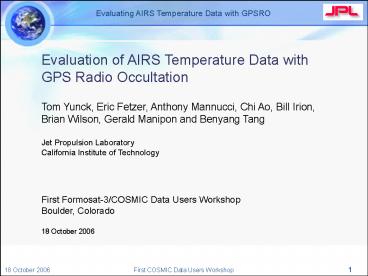Evaluation of AIRS Temperature Data with GPS Radio Occultation - PowerPoint PPT Presentation
1 / 28
Title:
Evaluation of AIRS Temperature Data with GPS Radio Occultation
Description:
Controlled 3-way study. Evaluating AIRS Temperature Data with GPSRO ... Mid-Latitude. Sigma solutions with AIRS-ECM cross correlation ... – PowerPoint PPT presentation
Number of Views:49
Avg rating:3.0/5.0
Title: Evaluation of AIRS Temperature Data with GPS Radio Occultation
1
Evaluation of AIRS Temperature Data with GPS
Radio Occultation Tom Yunck, Eric Fetzer,
Anthony Mannucci, Chi Ao, Bill Irion, Brian
Wilson, Gerald Manipon and Benyang Tang Jet
Propulsion Laboratory California Institute of
Technology First Formosat-3/COSMIC Data Users
Workshop Boulder, Colorado 18 October 2006
2
AIRS, AMSR-E, AMSU-A, ATMS, AVHRR, CMIS, CrIS,
HIRS, MHS, MISR, MLS, MODIS, SBUV, VIIRS,
3
The most detailed atmospheric soundings
currently come from the AIRS instrument on NASAs
Aqua satellite. -- Space News, 9/18/06
2378 channels
4
- AIRS Temperature Specification/Requirement
- 1 K temperature accuracy
- 1 km vertical resolution
- Boundary layer to stratosphere
5
AIRS vs Radiosondes
Divakarla (2006) (Sea)
Clear
All
6
AIRS vs ECMWF
AIRS-ECMWF RMS
15 AIRS focus days
Altitude, km
Temp, K
7
Enter GPSRO
AIRS-ECMWF RMS GPS-AIRS RMS GPS-ECMWF RMS
Altitude, km
AIRS focus days
Temp, K
8
COSMIC GPS-GPS Comparison
9
COSMIC GPS-GPS Comparison
10
AIRS-ECMWF RMS GPS-AIRS RMS GPS-ECMWF RMS
Altitude, km
Temp, K
11
Controlled 3-way study
RMS Deviations
12
Simple Analysis
Measurement Truth (T) bias (b) zero mean
random error (e) M T b
e Measurement difference M1 - M2 is
therefore M1,2 b1 - b2 e1 - e2
b1,2 e1 - e2 The mean (expected) squared
(MS) difference is therefore MS1,2 b1,22
s12 s22 (assuming e1 and e2 uncorrelated)
13
Or MS1,2 - b1,22 s12 s22 (i.e.,
Var MS - square of the mean)
14
sECM 0.69K sAIRS 1.17K sGPS 1.30K
1.36 1.52 1.80
15
Mid-Latitude Simple sigma solutions
16
COSMIC GPS-GPS Comparison
17
Two possibilities 1. 2.
GPS retrievals have common errors that vary with
time, location, atmospheric conditions, etc.
These are removed in GPS-GPS comparisons.
AIRS and ECMWF have common errors that vary with
time, location, atmospheric conditions, etc.
These are removed in AIRS-ECMWF comparisons.
18
What this means
Measurement difference M1 - M2 is M1,2 b1,2
e1 - e2 The mean squared (MS) difference
is MS1,2 b1,22 s12 s22 (assuming
e1 and e2 uncorrelated)
- 2Ee1e2
19
- Some Sources of GNSS RO Systematic Error
- Assumption of spherical symmetry
- Assumption of minimal moisture above 7 km
- Ignoring of higher order ionospheric effects
- Retrievals initialized at 40 km with ECMWF
- GPS and LEO orbit errors
- Receiver tracking errors
These have been carefully evaluated and are
believed to be small. But are they?
20
Mid-Latitude Simple sigma solutions
21
Mid-Latitude Simple sigma solutions
22
- Possible Source of AIRS-ECMWF Correlation
- Training of AIRS regression on ECMWF data from
Aug 2002, combined with constrained retrieval
estimate that returns close to the step-1
regression estimate.
23
Revised Analysis
For the three-way comparison we now have
(1) MSE,A - bE,A2 sE2 sA2 -
2?E,A2 (2) MSA,G - bA,G2 - sG2
sA2 (3) MSE,G - bE,G2 - sG2 sE2
24
Mid-Latitude Simple sigma solutions
25
Mid-Latitude Sigma solutions with AIRS-ECM cross
correlation
26
Tropics Simple sigma solutions
27
Tropics Sigma solutions with AIRS-ECM cross
correlation
28
- Conclusions
- Typical RO single-profile temperature precision
is better than 1 Kelvin between 5 and 25 km
altitude. - Other systematic RO errors are believed to be no
greater than 0.5 Kelvin for a single profile. - Assuming that is true, comparisons of RO results
with AIRS temperature retrievals and daily ECMWF
weather models indicate partial correlation
between AIRS and ECMWF values. - This could arise because AIRS retrievals are
initialized with an estimate derived from ECMWF
training samples.































